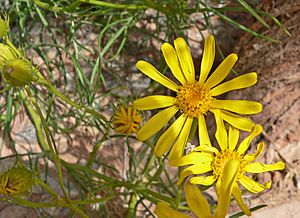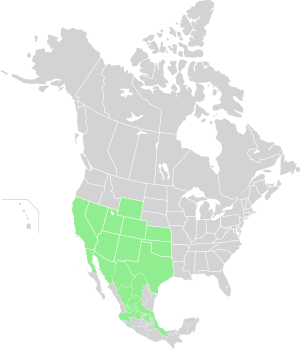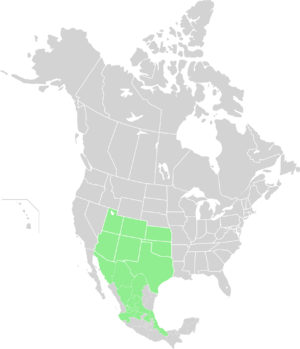Threadleaf ragwort facts for kids
Quick facts for kids Threadleaf ragwort |
|
|---|---|
 |
|
| Threadleaf ragwort | |
| Scientific classification |
|
| Kingdom: | Plantae |
| Clade: | Tracheophytes |
| Clade: | Angiosperms |
| Clade: | Eudicots |
| Clade: | Asterids |
| Order: | Asterales |
| Family: | Asteraceae |
| Genus: | Senecio |
| Species: |
S. flaccidus
|
| Binomial name | |
| Senecio flaccidus Less.
|
|
 |
|
| Range of S. flaccidus | |
| Script error: The function "autoWithCaption" does not exist. | |
| Synonyms | |
|
Senecio longilobus Benth |
|
Script error: No such module "Check for conflicting parameters".
Senecio flaccidus, also known as threadleaf ragwort, is a plant that belongs to the daisy family. It's part of the Senecio group of plants. This plant is native to the southwestern Great Plains in North America. It has many common names, like threadleaf groundsel or bush senecio.
Contents
What Does Threadleaf Ragwort Look Like?
Threadleaf ragwort is a fast-growing, bushy plant. It usually lives for about 3 to 6 years. This plant can grow up to about 1.4 meters (4 feet 6 inches) tall. You often find it in rocky areas, dry creek beds, or along roads. It prefers places away from the coast.
Leaves and Stems of the Plant
The plant gets its common name, "threadleaf," from its unique leaves. These leaves are white, thin like threads, and often look bent or matted. They are arranged alternately along the stem. Each leaf is deeply divided into five to nine narrow, finger-like parts. The leaves are smooth, meaning they have no hairs, and are gray-green. They can be from 1 centimeter (0.4 inches) to 4 centimeters (1.6 inches) long. Smaller groups of leaves often grow where the main leaves join the stem. The stems have grooves, and the branches are thin. They are soft and green at the top but become woody near the base.
Bright Yellow Flowers
Threadleaf ragwort has showy flowers that look like small sunflowers. These flowers are bright yellow and measure about 3 to 4 centimeters (1.2 to 1.6 inches) across. Each flower head has eight to thirteen petals, which are called ray flowers. In the center, there are purplish-brown disk florets. These disk florets are where the seeds are made.
Seeds of Threadleaf Ragwort
The fruits of this plant are called achenes. Each achene is about 3 millimeters (1/8 inch) long. They have ribs and are covered with short, white hairs. These achenes contain the seeds.
Where Does Threadleaf Ragwort Grow?
Like many plants in the Senecio group, threadleaf ragwort likes places that have been disturbed. This includes areas where animals have grazed a lot, dried-up stream beds, and desert grasslands. It grows at elevations between about 550 meters (1,800 feet) and 2,000 meters (6,500 feet).
Native Areas
Threadleaf ragwort is originally from these parts of America:
- North-Central United States: Kansas, Oklahoma
- Northwestern United States: Colorado
- South-Central United States: New Mexico, Texas
- Southwestern United States: Arizona, Utah
- Northern Mexico: Chihuahua, Coahuila, Durango, San Luis Potosí, Sonora, Zacatecas
- Central Mexico: Aguascalientes, Guanajuato, Hidalgo, Jalisco (northeastern part), Veracruz
Current Locations
Today, you can find threadleaf ragwort in these areas:
- North-Central United States: Kansas, Oklahoma, Wyoming
- Northwestern United States: Colorado
- South-Central United States: New Mexico, Texas
- Southwestern United States: Arizona, California, Nevada, Utah
- Northern Mexico: Chihuahua, Coahuila, Durango, San Luis Potosí, Sonora, Zacatecas, Baja California
- Central Mexico: Aguascalientes, Baja Norte, Guanajuato, Hidalgo, Jalisco (northeastern part), Veracruz
Why is Threadleaf Ragwort Important?
Threadleaf ragwort grows quickly in disturbed areas, like lands where many animals have grazed. It helps cover the ground fast and keeps the soil from washing away. This is important for the environment.
Plant Safety for Animals
However, this plant contains natural chemicals called alkaloids. If animals like cattle or horses eat a lot of it, these chemicals can cause liver problems. Because of this, it's not a good food source for them. Some of the chemicals found in this plant include longilobine and senecionine.
 | Misty Copeland |
 | Raven Wilkinson |
 | Debra Austin |
 | Aesha Ash |


